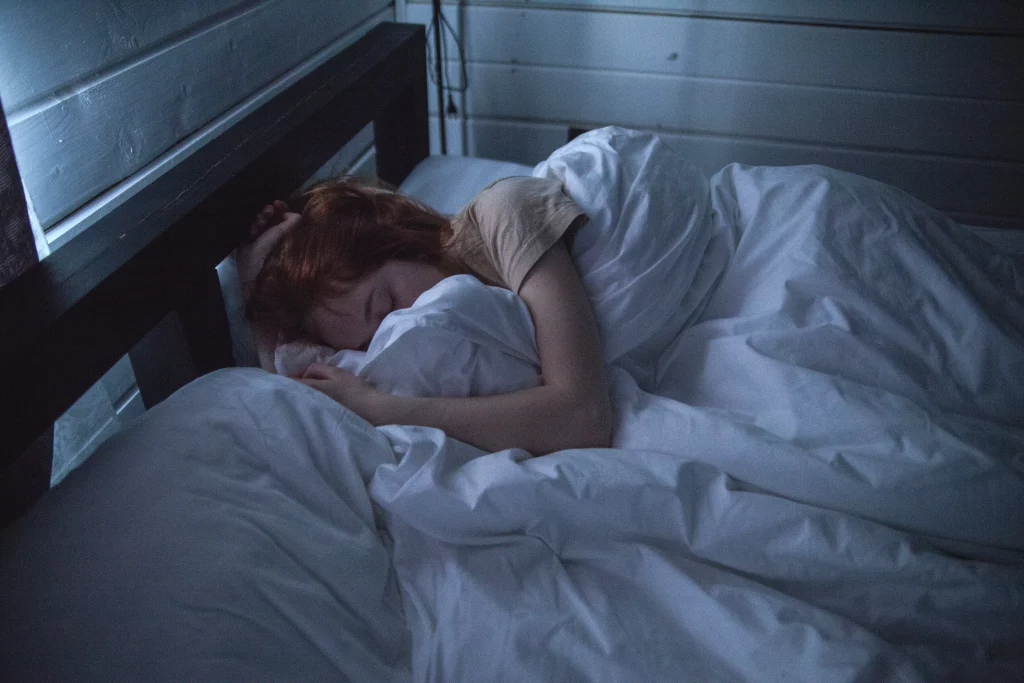Had enough of that exhaustion? Discover these easy, secret methods to improve your sleep tonight.
Insufficient sleep can compromise the immune system. When chronic sleep deprivation combines with the stress of an infection, it can overwhelm our body and health. Following a night of tossing and turning, when you are awake, you can feel sleepy and grumpy. Restless nights and weary mornings can become more common as we age and our sleep patterns shift.
While occasional difficulty sleeping is common, persistent insomnia can escalate into a significant issue. Beyond causing fatigue and moodiness, chronic sleep deprivation can profoundly impact our health, elevating the risk of obesity, heart disease, and type 2 diabetes.
Establishing a healthy bedtime routine can facilitate the transition from feeling keyed-up to relaxed, preparing both your body and mind to embrace sleep. The essential strategy is to approach it gradually. Here are some secret tips to help you ease into it:
(1) Establish a Consistent Sleep Schedule
Establishing a consistent sleep schedule is paramount for regulating the body’s internal clock, aiding in the management of insomnia. By adhering to a regular bedtime and wake-up routine, even on weekends, individuals synchronize their natural sleep-wake cycle. This consistency helps signal to the body when it’s time to sleep, promoting deeper and more restful rest. It optimizes the production of sleep hormones, such as melatonin, enhancing the quality and duration of sleep. Moreover, maintaining a stable schedule reinforces the body’s circadian rhythm, reducing the likelihood of disruptions that can lead to sleep difficulties and ensuring a more rejuvenating night’s rest.
Tips: Technologies such as sleep Tracking apps, sleep aid watch , white noise machines, and sleep coaching programs can assist in establishing and maintaining a healthy sleep schedule by tracking sleep patterns, regulating light exposure, and providing personalized guidance and support.
(2) Create a Relaxing Bedtime Routine
Creating a relaxing bedtime routine primes the mind and body for sleep, offering a sanctuary from the stresses of the day. Engaging in calming activities, like reading a book or taking a warm bath, signals to the brain that it’s time to wind down. These rituals trigger the release of sleep-promoting hormones and neurotransmitters, such as serotonin and dopamine, promoting a sense of relaxation and tranquility. By consistently practicing a soothing pre-sleep ritual, individuals condition their bodies to associate bedtime with restfulness, facilitating the transition into a deeper and more restorative sleep state. This routine becomes a cornerstone of healthy sleep hygiene, fostering improved overall sleep quality.
Tips: For creating a relaxing bedtime routine, consider using smartphone apps for guided meditation or relaxation exercises, smart speakers for playing calming music or white noise, smart light bulbs to dim the lights gradually, and aromatherapy diffusers with programmable timers for soothing scents.

(3) Optimize Your Sleep Environment
Optimizing the sleep environment is crucial for fostering a conducive atmosphere that promotes deep and uninterrupted sleep. This involves ensuring that the bedroom is dark, quiet, and cool, which can help minimize disruptions and distractions that may interfere with sleep onset and maintenance. Implementing blackout curtains, white noise machines, or earplugs can further enhance the sleep environment by blocking out unwanted sounds and light. By creating a comfortable and tranquil space dedicated solely to sleep, individuals can maximize their chances of experiencing restorative rest, allowing for rejuvenation of the body and mind during the night for improved daytime functioning.
Tips: To optimize your sleep environment, consider using smart curtains or blinds to block out light, smart thermostats to maintain a comfortable temperature, white noise machines or smart speakers for ambient sounds, and air purifiers to ensure clean air. Additionally, invest in a comfortable mattress, and pillows suitable for your sleep preferences as well as a Lavender pillow spray to induce sleep.
(4) Limit Exposure to Screens
Limiting exposure to screens before bedtime is essential for promoting better sleep quality. Electronic devices emit blue light, which can suppress the production of melatonin, the hormone responsible for regulating sleep-wake cycles. This suppression disrupts the body’s natural circadian rhythm, making it harder to fall asleep and stay asleep. By avoiding screens at least an hour before bedtime, individuals allow their brains to wind down and prepare for sleep. This practice helps signal to the body that it’s time to rest, facilitating the transition into a deeper and more restful sleep state, ultimately leading to improved overall sleep quality and daytime functioning.
Tips: To limit exposure to screens before bedtime, utilize smartphone apps with screen time tracking and bedtime reminders. Employ blue light filter apps or screen dimming features built into devices. Set up charging stations outside the bedroom to deter late-night screen use. Wear blue light-blocking glasses when using screens in the evening.

(5) Mind Your Diet and Exercise
Maintaining a balanced diet and regular exercise routine positively influences sleep quality. Regular physical activity promotes deeper and more restful sleep by reducing stress and anxiety, releasing endorphins, and regulating body temperature. However, vigorous exercise close to bedtime can stimulate the body and disrupt sleep patterns. Additionally, monitoring caffeine and alcohol intake is crucial as both can interfere with sleep. Caffeine is a stimulant that can inhibit sleep onset, while alcohol may initially induce drowsiness but disrupts sleep patterns later in the night. By prioritizing a healthy lifestyle, individuals can optimize their sleep quality, leading to enhanced overall well-being and daytime productivity.
Tips: For tracking your diet and exercise, use smartphone apps or wearable fitness trackers to monitor calorie intake, macronutrient balance, and physical activity levels. Utilize meal planning apps to schedule nutritious meals and snacks. Employ smart scales and heart rate monitors for accurate measurements. Join online fitness communities for accountability and support.
(6) Manage Stress and Anxiety
Managing stress and anxiety is vital for improving sleep quality. Stress and anxiety can disrupt sleep patterns, making it difficult to fall asleep or stay asleep throughout the night. Implementing relaxation techniques such as mindfulness meditation, deep breathing exercises, or progressive muscle relaxation can help calm the mind and body before bedtime. By practicing these techniques regularly, individuals can reduce overall stress levels, alleviate anxiety, and promote a sense of relaxation conducive to falling asleep more easily and enjoying a deeper, more restorative sleep. This, in turn, enhances overall well-being and daytime functioning by ensuring adequate rest and rejuvenation during the night.
Tips: To manage stress and anxiety, try meditation or mindfulness apps for guided relaxation exercises. Utilize biofeedback devices to monitor and regulate stress levels. Employ Smart Aromatherapy Diffusers with calming scents like lavender. Join online support groups or therapy apps for counseling and coping strategies.

(7) Watch Your Bedroom Usage
Designating the bedroom solely for sleep and intimacy fosters a mental association between the space and restfulness. Using electronic devices or working in bed can disrupt this association, confusing the brain and hindering the ability to relax and fall asleep. By reserving the bedroom for sleep-related activities only, individuals create a sanctuary free from distractions and stressors, optimizing the sleep environment. This practice helps condition the mind to associate the bedroom with rest, making it easier to unwind and drift off to sleep. Ultimately, it promotes better sleep quality and overall well-being by fostering a conducive environment for restorative rest.
Tips: For organizing bedroom usage, implement smart home routines to automate tasks like dimming lights and playing relaxing music at bedtime. Utilize task management apps to schedule and prioritize bedroom-related activities. Employ smart storage solutions like under-bed organizers or wardrobe systems to keep the bedroom clutter-free. Create designated areas for work and relaxation to promote better sleep hygiene.
(8) Try Home Remedies
Home remedies such as Melatonin can aid in improving sleep quality. Valerian root, chamomile tea, and melatonin are commonly used for their calming effects on the body. Valerian root acts as a mild sedative, chamomile contains compounds that promote relaxation, and melatonin helps regulate the sleep-wake cycle. However, it’s essential to consult with a healthcare professional before trying any new supplement, as they may interact with medications or have side effects. While these remedies may offer some relief for occasional insomnia, they are most effective when combined with other sleep-promoting practices, such as maintaining a consistent sleep schedule and creating a relaxing bedtime routine.
Tips: Home Remedy could also be using essential oils like lavender in a diffuser to promote relaxation. Incorporate relaxation techniques such as deep breathing exercises or progressive muscle relaxation. Ensure a comfortable sleep environment with supportive bedding and optimal room temperature.
(9) Limit Naps
Limiting daytime naps can aid in improving nighttime sleep quality. While short naps can provide a quick energy boost, long or irregular naps can disrupt the body’s natural sleep-wake cycle. Sleeping during the day may decrease the body’s sleep drive, making it harder to fall asleep at night and leading to fragmented sleep. If napping is necessary, aim for a short nap of around 20-30 minutes early in the afternoon to avoid interfering with nighttime sleep. By limiting daytime naps, individuals can enhance their ability to achieve deeper and more restorative sleep during the night, promoting overall sleep quality and daytime alertness.
Tips: To limit naps effectively, establish a consistent sleep schedule to reduce daytime sleepiness. Use alarm clocks or smartphone reminders to wake up from short naps promptly. Engage in stimulating activities or exercise during the day to maintain alertness. Avoid napping in the late afternoon or evening to prevent interference with nighttime sleep. Practice relaxation techniques or take a brisk walk if feeling drowsy instead of napping.
Join us as we share related topics on mental well-being, tips, and more!



























